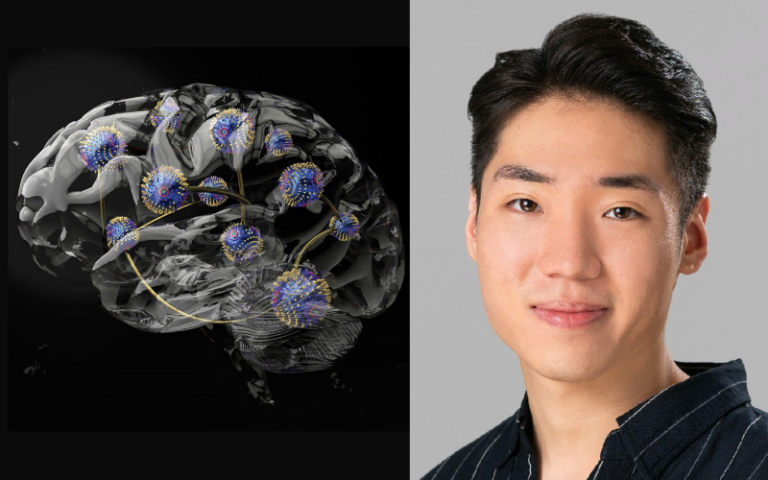UCL research on brain-inspired computing published in Nature Materials
13 November 2023
Collaborative research led by UCL and Imperial researchers on brain-inspired computing has been published in the latest edition of Nature Materials.

The paper, lead authored by Oscar Lee, researcher at UCL’s Electronic and Electrical Engineering Department and the London Centre for Nanotechnology, has shown that by harnessing the intriguing properties of specific magnets known as "chiral magnets", one can realise the potential of brain-inspired computing for creating artificial intelligence hardware.
Traditional computers pose significant environmental concerns due to their vast electricity consumption. Conventional computing architecture separates data storage and processing units, which wastes heat between information transfers. This problem is especially amplified with complex machine-learning tasks that require vast amounts of data for processing.
Neuromorphic computing, on the other hand, takes its architecture inspired by the brain and removes the necessity of distinct memory and processing units, facilitating more efficient ways to process data.
In the field of neuromorphic computing, an approach known as "Physical Reservoir Computing" (PRC) uses the intrinsic physical properties of materials as a computational medium. However, many PRC systems have limited reconfigurability of their computational properties, so they can excel at only a specific subset of tasks. For example, once a PRC system is built, it may be great at performing a particular machine learning task, such as future forecasting, but cannot adapt to a different task and requires building an entirely new device suited for that application.
The recent work published in Nature Materials overcomes this problem by utilising the rich magnetic phase spaces of a single chiral magnet, enabling reconfigurable reservoir properties on demand. A chiral magnet is a class of magnetic materials that can host unique magnetic properties, which can be tuned by applying an external magnetic field or changing the temperature. This is akin to applying temperature or pressure to water to change its states between solid, liquid and gas.
The results show that by accessing different magnetic phases, they can acquire distinct properties beneficial for different types of computation. For example, one phase has a potent memory capacity for prediction tasks, another phase boasts high nonlinearity ideal for transformation tasks. Such a simple concept can remarkably bring an innovative approach to task-adaptive computing, all within a single material.
Overall, the study highlights the substantial benefit of an on-demand reconfigurability of computational properties for PRC. This work brings us a step closer to realising the full potential of physical reservoirs to create computers that not only require significantly less energy but also adapt their computational properties to perform optimally across various tasks, just like our brains. The next step will be to realise materials and develop appropriate device architectures that are commercially viable and scalable.
The research is a collaboration between:
UCL:
- Oscar Lee
- Professor Hidekazu Kurebayashi
Imperial College London:
- Dr Jack Gartside
- Kilian Stenning
- Professor Will Branford
International collaborators included researchers at the University of Tokyo and Technische Universität München and was supported by the Leverhulme Trust, Engineering and Physical Sciences Research Council (EPSRC), Imperial College London President’s Excellence Fund for Frontier Research, Royal Academy of Engineering, the Japan Science and Technology Agency, Katsu Research Encouragement Award, Asahi Glass Foundation, and the DFG (German Research Foundation).
 Close
Close

